Charles E W Bean, Diaries, AWM38 3DRL 606/101/1 - February - March 1918 - Part 5
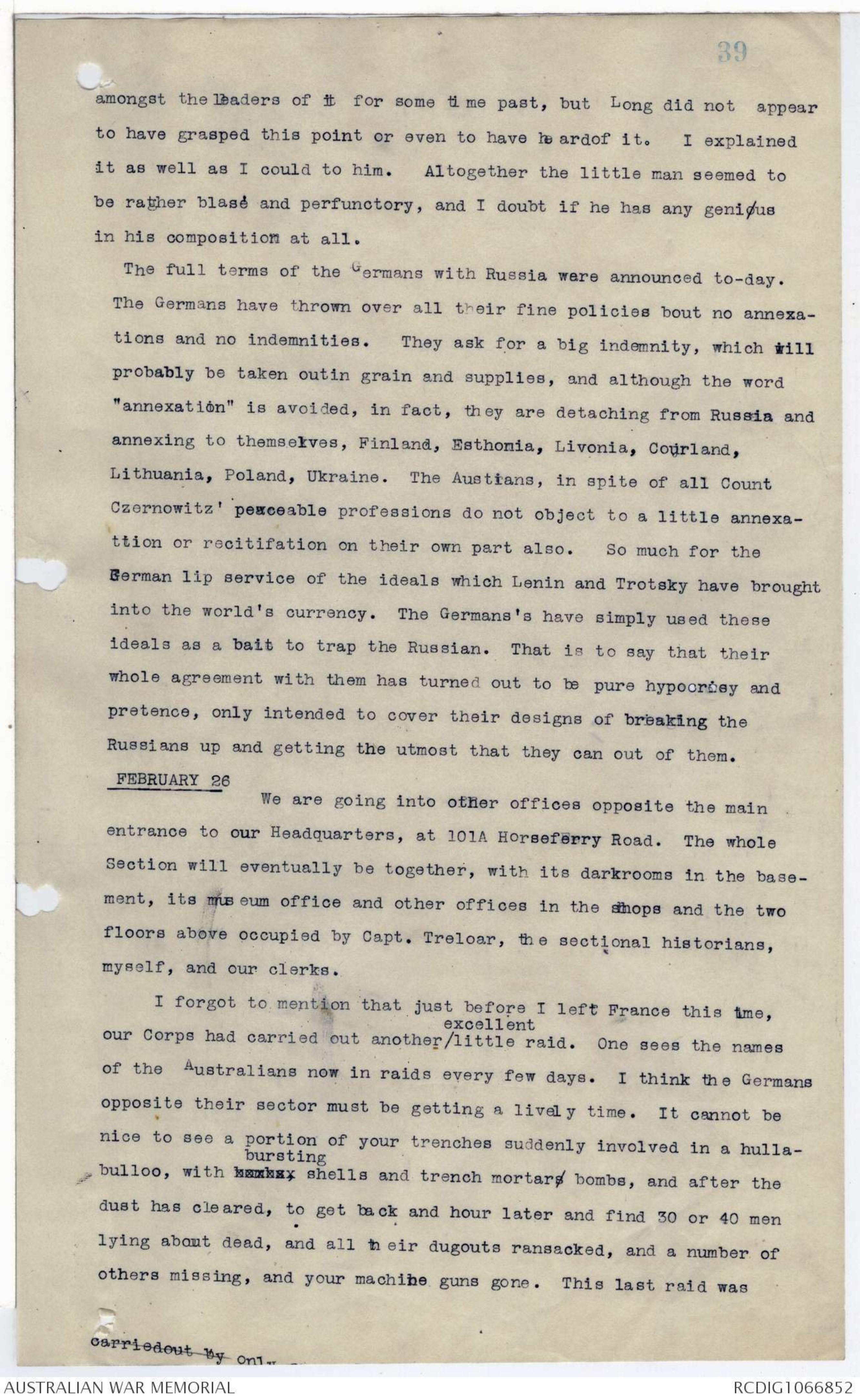
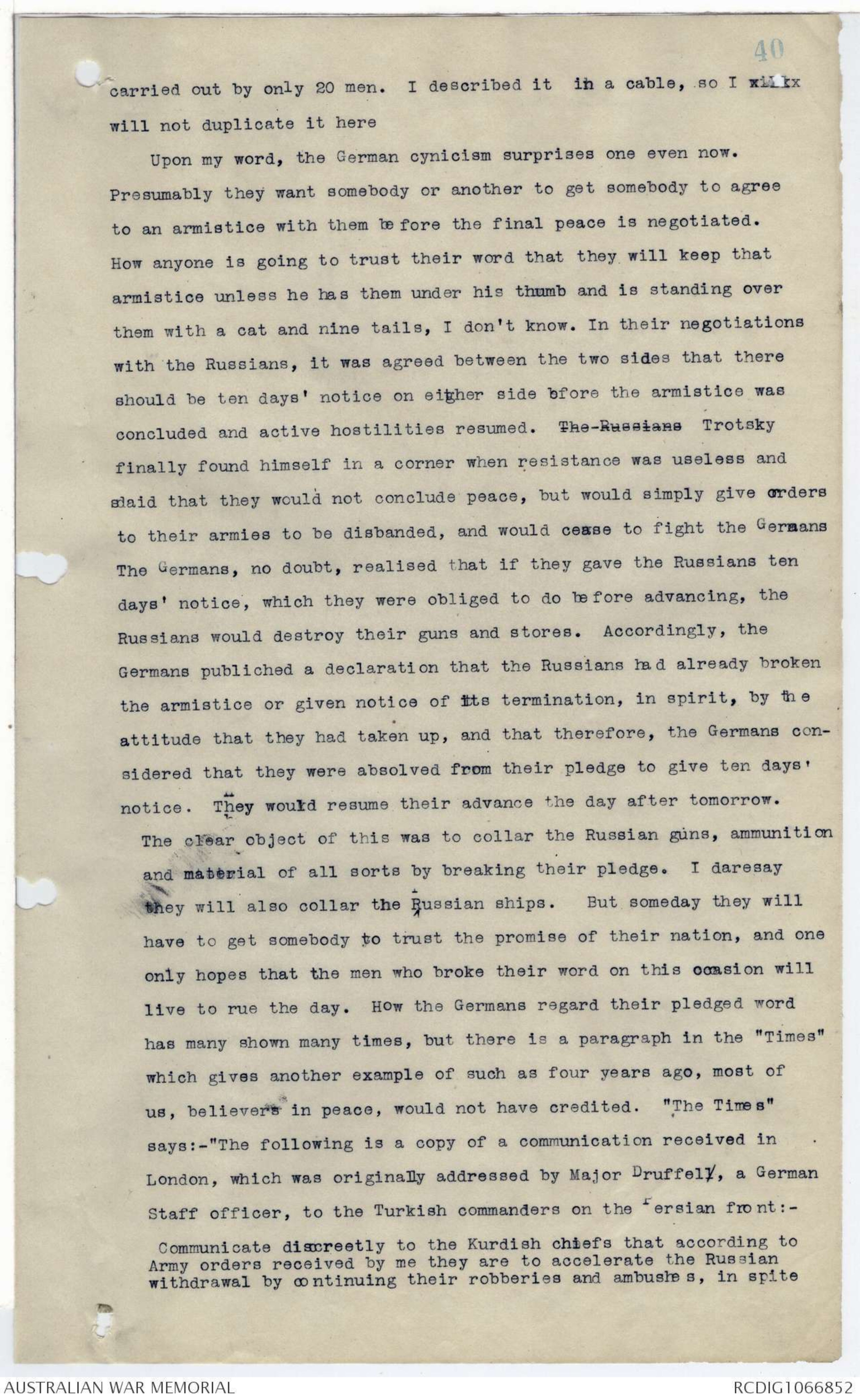
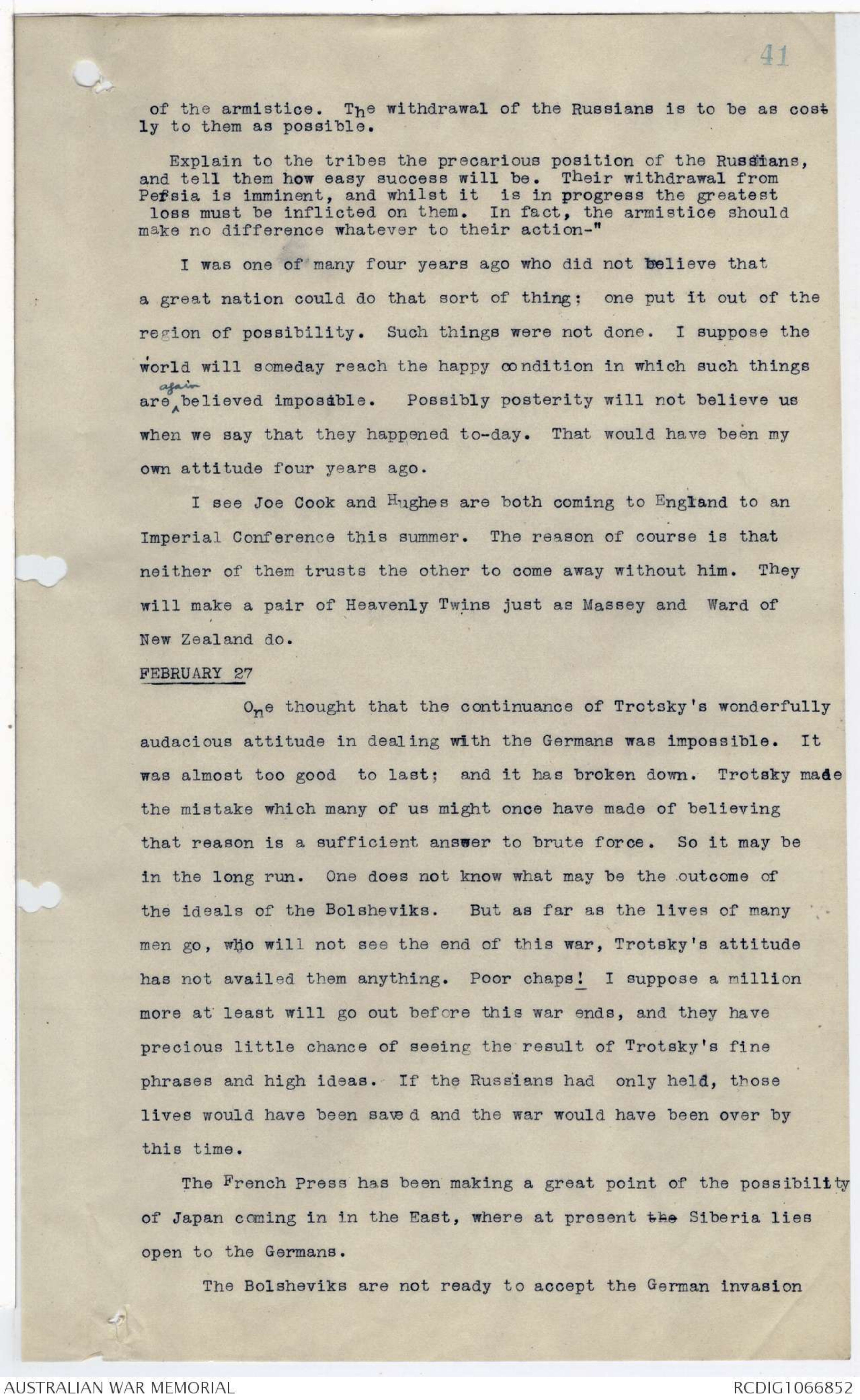
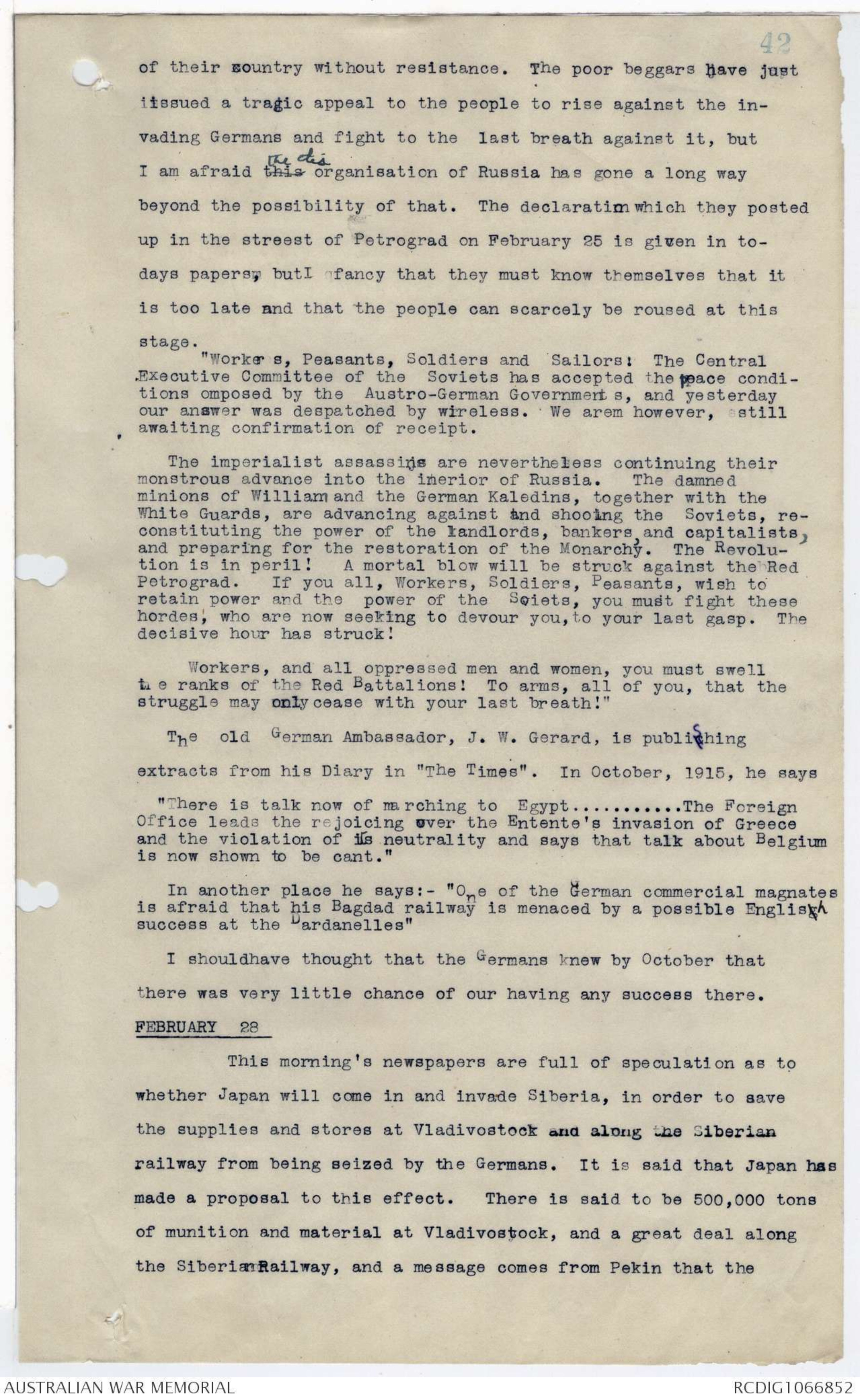
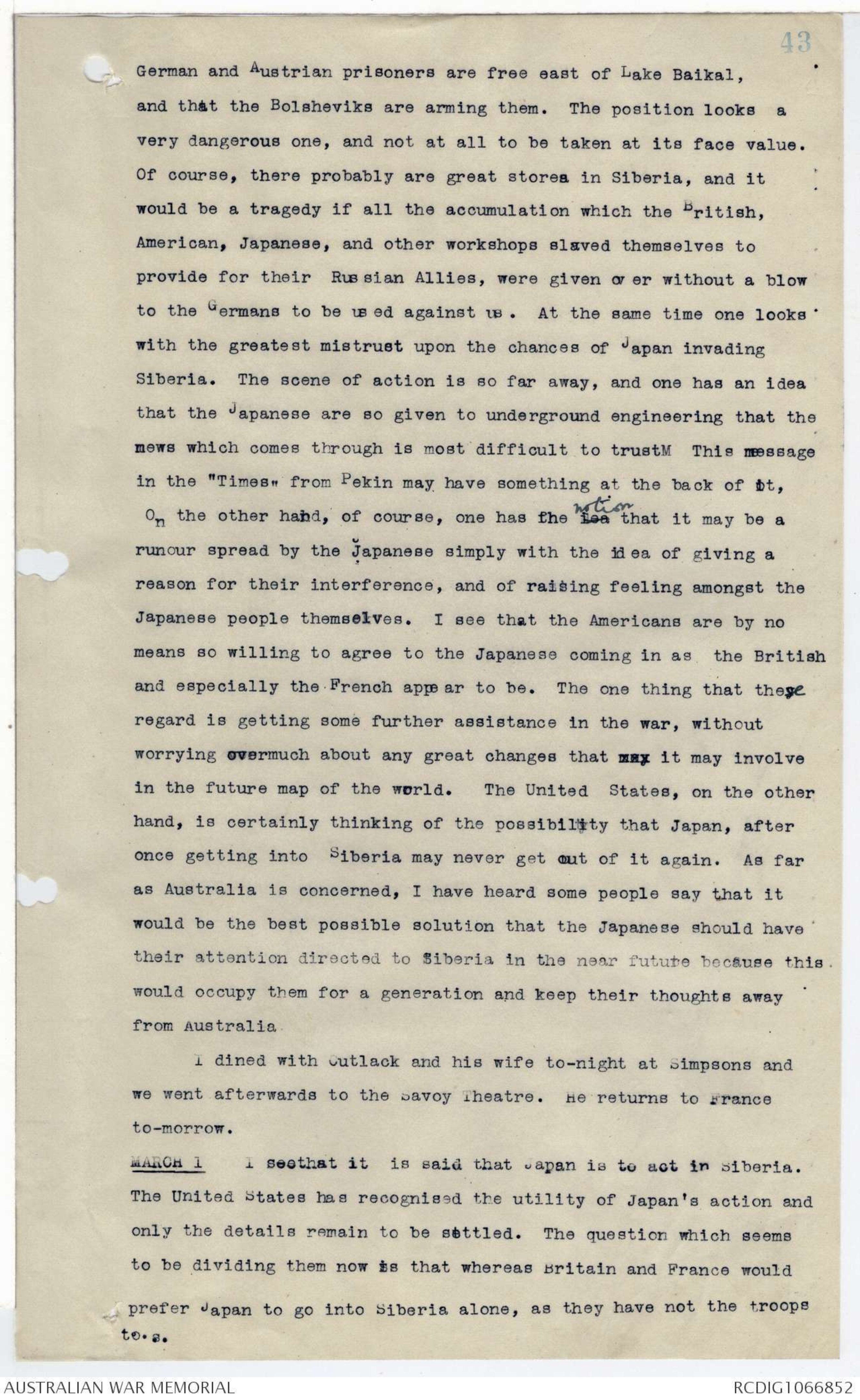
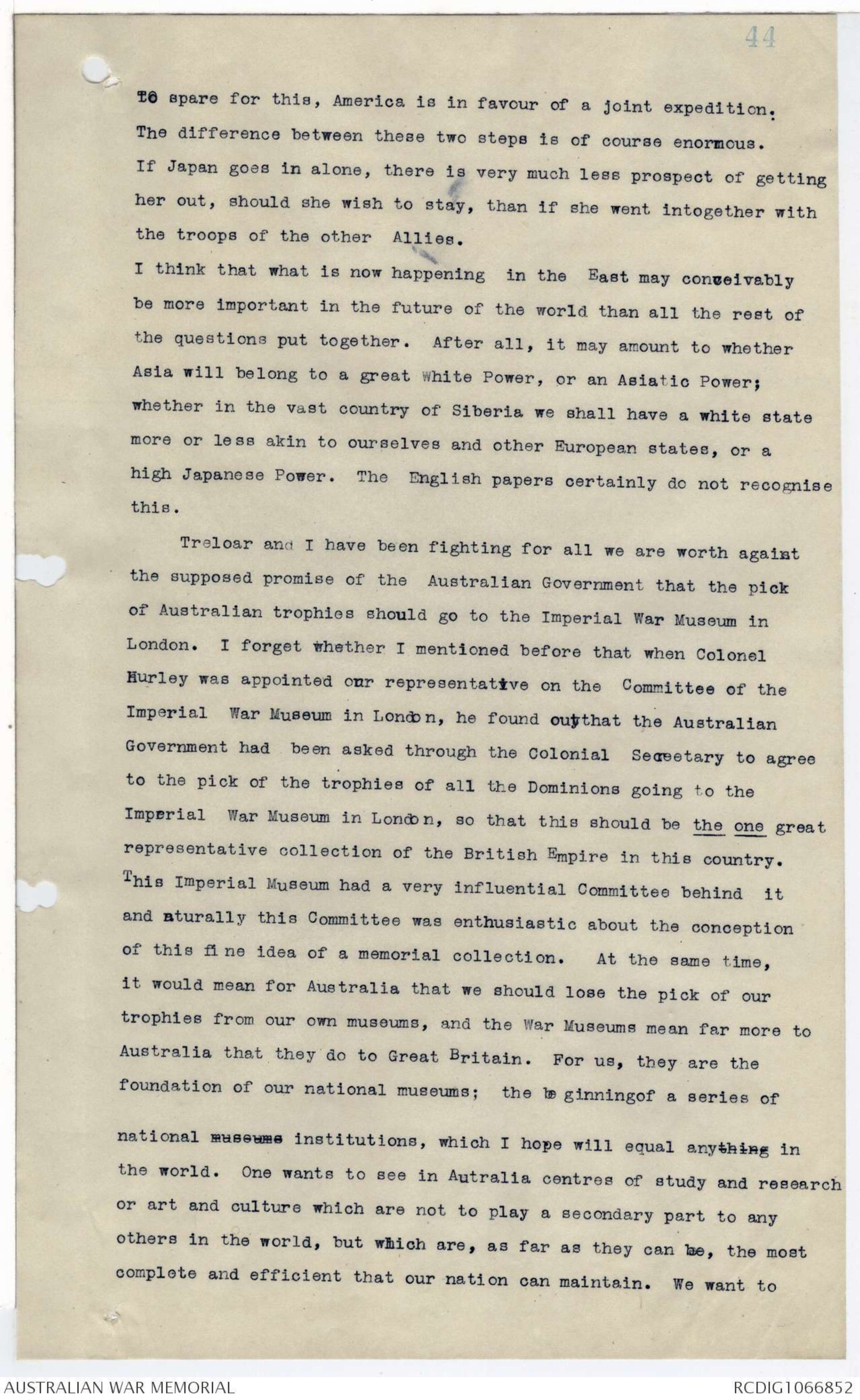
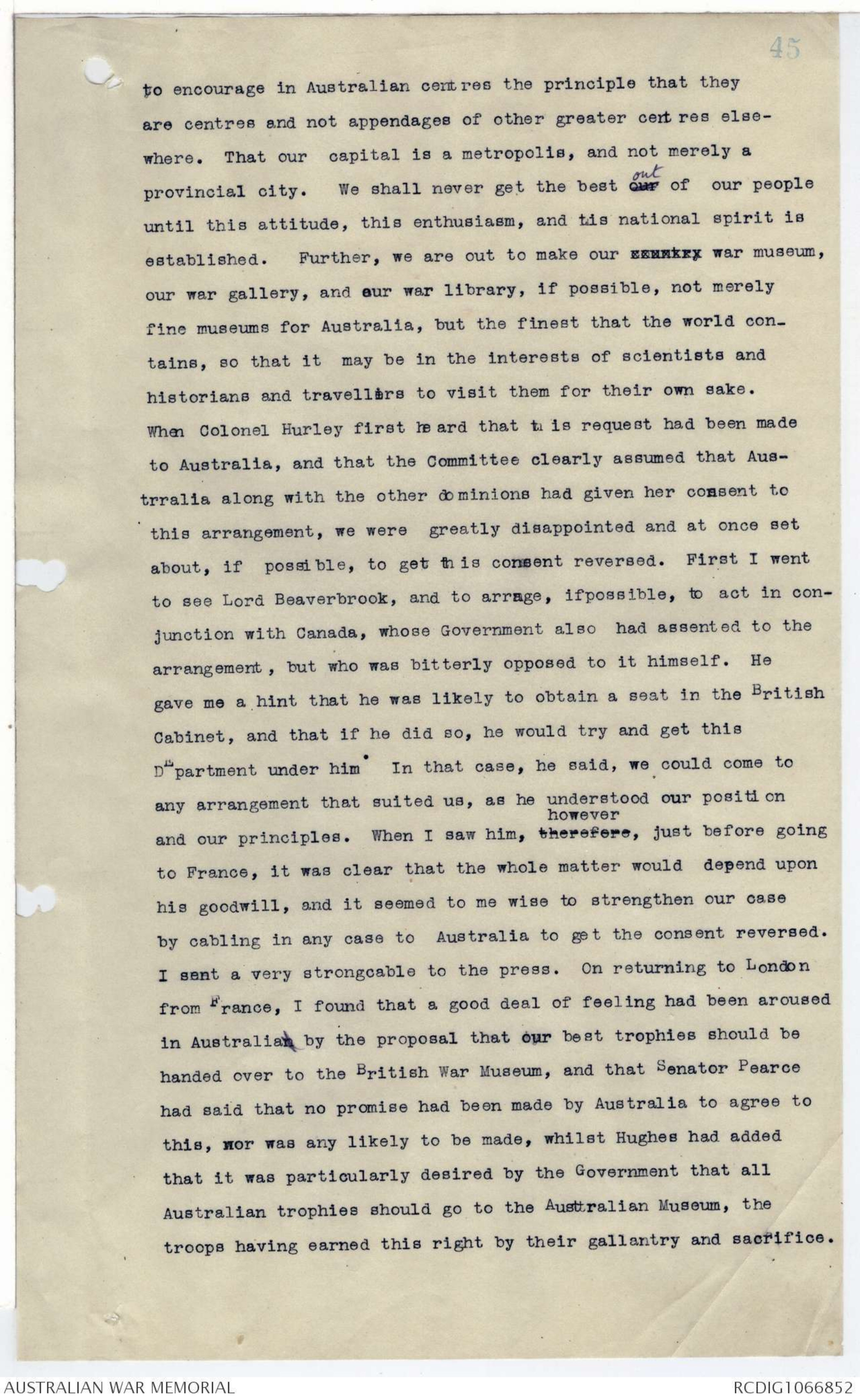
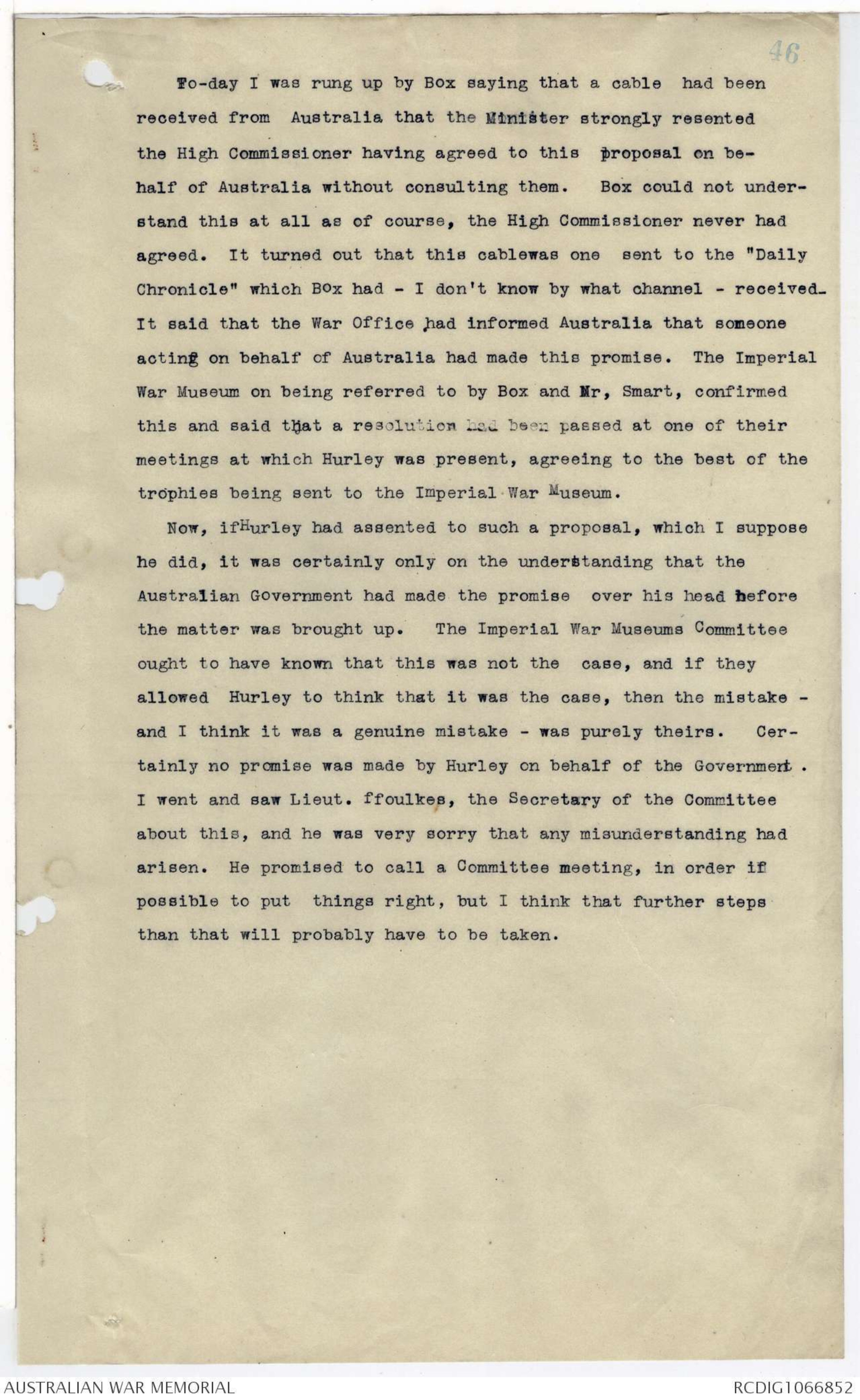
39
amongst the leaders of it for some ti me past, but Long did not appear
to have grasped this point or even to have he ardof it. I explained
it as well as I could to him. Altogether the little man seemed to
be rather blasē and perfunctory, and I doubt if he has any genious
in his composition at all.
The full terms of the Germans with Russia were announced to-day.
The Germans have thrown over all their fine policies bout no annexations
and no indemnities. They ask for a big indemnity, which will
probably be taken outin grain and supplies, and although the word
"annexation" is avoided, in fact, they are detaching from Russia and
annexing to themselves, Finland, Esthonia, Livonia, Courland,
Lithuania, Poland, Ukraine. The Austrians, in spite of all Count
Czernowitz' peaceable professions do not object to a little annexation
or recitifation on their own part also. So much for the
German lip service of the ideals which Lenin and Trotsky have brought
into the world's currency. The German's have simply used these
ideals as a bait to trap the Russian. That is to say that their
whole agreement with them has turned out to be pure hypocrisy and
pretence, only intended to cover their designs of breaking the
Russians up and getting the utmost that they can out of them.
FEBRUARY 26
We are going into other offices opposite the main
entrance to our Headquarters, at 101A Horseferry Road. The whole
Section will eventually be together, with its darkrooms in the basement,
its museum office and other offices in the shops and the two
floors above occupied by Capt. Treloar, the sectional historians,
myself, and our clerks.
I forgot to mention that just before I left France this time,
our Corps had carried out another/excellent little raid. One sees the names
of the Australians now in raids every few days. I think the Germans
opposite their sector must be getting a lively time. It cannot be
nice to see a portion of your trenches suddenly involved in a hullabulloo,
with xxxxxx/bursting shells and trench mortars bombs, and after the
dust has cleared, to get back and hour later and find 30 or 40 men
lying about dead, and all their dugouts ransacked, and a number of
others missing, and your machine guns gone. This last raid was
carried out by only
40
carried out by only 20 men. I described it in a cable, so I xxxxx
will not duplicate it here
Upon my word, the German cynicism surprises one even now.
Presumably they want somebody or another to get somebody to agree
to an armistice with them be fore the final peace is negotiated.
How anyone is going to trust their word that they will keep that
armistice unless he has them under his thumb and is standing over
them with a cat and nine tails, I don't know. In their negotiations
with the Russians, it was agreed between the two sides that there
should be ten days' notice on either side before the armistice was
concluded and active hostilities resumed. The Russians Trotsky
finally found himself in a corner when resistance was useless and
sdaid that they would not conclude peace, but would simply give orders
to their armies to be disbanded, and would cease to fight the Germans
The Germans, no doubt, realised that if they gave the Russians ten
days' notice, which they were obliged to do before advancing, the
Russians would destroy their guns and stores. Accordingly, the
Germans publiched a declaration that the Russians had already broken
the armistice or given notice of its termination, in spirit, by the
attitude that they had taken up, and that therefore the Germans considered
that they were absolved from their pledge to give ten days'
notice. They would resume their advance the day after tomorrow.
The clear object of this was to collar the Russian guns, ammunition
and material of all sorts by breaking their pledge. I daresay
they will also collar the Russian ships. But someday they will
have to get somebody to trust the promise of their nation, and one
only hopes that the men who broke their word on this occasion will
live to rue the day. How the Germans regard their pledged word
has many shown many times, but there is a paragraph in the "Times"
which gives another example of such as four years ago, most of
us, believers in peace, would not have credited. "The Times"
says:-"The following is a copy of a communication received in
London, which was originally addressed by Major Druffell, a German
Staff officer, to the Turkish commanders on the Persian front:-
Communicate discreetly to the Kurdish chiefs that according to
Army orders received by me they are to accelerate the Russian
withdrawal by continuing their robberies and ambushe s, in spite
41
of the armistice. The withdrawal of the Russians is to be as costly
to them as possible.
Explain to the tribes the precarious position of the Russians,
and tell them how easy success will be. Their withdrawal from
Persia is imminent, and whilst it is in progress the greatest
loss must be inflicted on them. In fact, the armistice should
make no difference whatever to their action-"
I was one of many four years ago who did not believe that
a great nation could do that sort of thing; one put it out of the
region of possibility. Such things were not done. I suppose the
world will someday reach the happy condition in which such things
are ^again believed impossible. Possibly posterity will not believe us
when we say that they happened to-day. That would have been my
own attitude four years ago.
I see Joe Cook and Hughes are both coming to England to an
Imperial Conference this summer. The reason of course is that
neither of them trusts the other to come away without him. They
will make a pair of Heavenly Twins just as Massey and Ward of
New Zealand do.
FEBRUARY 27
One thought that the continuance of Trotsky's wonderfully
audacious attitude in dealing with the Germans was impossible. It
was almost too good to last; and it has broken down. Trotsky made
the mistake which many of us might once have made of believing
that reason is a sufficient answer to brute force. So it may be
in the long run. One does not know what may be the outcome of
the ideals of the Bolsheviks. But as far as the lives of many
men go, who will not see the end of this war, Trotsky's attitude
has not availed them anything. Poor chaps! I suppose a million
more at least will go out before this war ends, and they have
precious little chance of seeing the result of Trotsky's fine
phrases and high ideas. If the Russians had only held, those
lives would have been saved and the war would have been over by
this time.
The French Press has been making a great point of the possibility
of Japan coming in in the East, where at present the Siberia lies
open to the Germans.
The Bolsheviks are not ready to accept the German invasion
42
of their country without resistance. The poor beggars have just
iissued a tragic appeal to the people to rise against the invading
Germans and fight to the last breath against it, but
I am afraid this/the disorganisation of Russia has gone a long way
beyond the possibility of that. The declaration which they posted
up in the streest of Petrograd on February 25 is given in to-days
papers, but I fancy that they must know themselves that it
is too late and that the people can scarcely be roused at this
stage.
"Worker s, Peasants, Soldiers and Sailors: The Central
Executive Committee of the Soviets has accepted the peace conditions
omposed by the Austro-German Government s, and yesterday
our answer was despatched by wireless. We arem however, still
awaiting confirmation of receipt.
The imperialist assassins are nevertheless continuing their
monstrous advance into the inerior of Russia. The damned
minions of William and the German Kaledins, together with the
White Guards, are advancing against and shooing the Soviets, reconstituting
the power of the landlords, bankers and capitalists,
and preparing for the restoration of the Monarchy. The Revolution
is in peril! A mortal blow will be struck against the Red
Petrograd. If you all, Workers, Soldiers, Peasants, wish to
retain power and the power of the Soiets, you must fight these
hordes, who are now seeking to devour you, to your last gasp. The
decisive hour has struck!
Workers, and all oppressed men and women, you must swell
the ranks of the Red Battalions! To arms, all of you, that the
struggle may only cease with your last breath!"
The old German Ambassador, J. W. Gerard, is publishing
extracts from his Diary in "The Times". In October, 1915 he says
"There is talk now of marching to Egypt...........The Foreign
Office leads the rejoicing over the Entente's invasion of Greece
and the violation of its neutrality and says that talk about Belgium
is now shown to be cant."
In another place he says:- "One of the German commercial magnates
is afraid that his Bagdad railway is menaced by a possible Englisgh
success at the Dardanelles"
I shouldhave thought that the Germans knew by October that
there was very little chance of our having any success there.
FEBRUARY 28
This morning's newspapers are full of speculation as to
whether Japan will come in and invade Siberia, in order to save
the supplies and stores at Vladivostock and along the Siberian
railway from being seized by the Germans. It is said that Japan has
made a proposal to this effect. There is said to be 500,000 tons
of munition and material at Vladivostock, and a great deal along
the SirberianRailway, and a message comes from Pekin that the
43
German and Austrian prisoners are free east of Lake Baikal,
and that the Bolsheviks are arming them. The position looks a
very dangerous one, and not at all to be taken at its face value.
Of course, there probably are great stores in Siberia, and it
would be a tragedy if all the accumulation which the British,
American, Japanese, and other workshops slaved themselves to
provide for their Russian Allies, were given ov er without a blow
to the Germans to be us ed against us. At the same time one looks
with the greatest mistrust upon the chances of Japan invading
Siberia. The scene of action is so far away, and one has an idea
that the Japanese are so given to underground engineering that the
news which comes through is most difficult to trustM This message
in the "Times" from Pekin may have something at the back of it,
On the other hand, of course, one has the iea/notion that it may be a
runour spread by the Japanese simply with the id ea of giving a
reason for their interference, and of raising feeling amongst the
Japanese people themselves. I see that the Americans are by no
means so willing to agree to the Japanese coming in as the British
and especially the French appear to be. The one thing that these
regard is getting some further assistance in the war, without
worrying overmuch about any great changes that xxx it may involve
in the future map of the world. The United States, on the other
hand, is certainly thinking of the possibility that Japan, after
once getting into Siberia may never get out of it again. As far
as Australia is concerned, I have heard some people say that it
would be the best possible solution that the Japanese should have
their attention directed to Siberia in the near future because this
would occupy them for a generation and keep their thoughts away
from Australia.
I dined with Cutlack and his wife to-night at Simpsons and
we went afterwards to the Savoy Theatre. He returns to France
to-morrow.
MARCH 1 I seethat it is said that Japan is to act in Siberia.
The United States has recognised the utility of Japan's action and
only the details remain to be settled. The question which seems
to be dividing them now is that whereas Britain and France would
prefer Japan to go into Siberia alone, as they have not the troops
to.s..
44
To spare for this, America is in favour of a joint expedition.
The difference between these two steps is of course enormous.
If Japan goes in alone, there is very much less prospect of getting
her out, should she wish to stay, than if she went intogether with
the troops of the other Allies.
I think that what is now happening in the East may conceivably
be more important in the future of the world than all the rest of
the questions put together. After all, it may amount to whether
Asia will belong to a great White Power, or an Asiatic Power;
whether in the vast country of Siberia we shall have a white state
more or less akin to ourselves and other European states, or a
high Japanese Power. The English papers certainly do not recognise
this.
Treloar and I have been fighting for all we are worth against
the supposed promise of the Australian Government that the pick
of Australian trophies should go to the Imperial War Museum in
London. I forget whether I mentioned before that when Colonel
Hurley was appointed our representative on the Committee of the
Imperial War Museum in London, he found out that the Australian
Government had been asked through the Colonial Secreetary to agree
to the pick of the trophies of all the Dominions going to the
Imperial War Museum in London, so that this should be the one great
representative collection of the British Empire in this country.
This Imperial Museum had a very influential Committee behind it
and naturally this Committee was enthusiastic about the conception
of this fine idea of a memorial collection. At the same time,
it would mean for Australia that we should lose the pick of our
trophies from our own museums, and the War Museums mean far more to
Australia that they do to Great Britain. For us, they are the
foundation of our national museums; the beginningof a series of
national museums institutions, which I hope will equal anything in
the world. One wants to see in Autralia centres of study and research
or art and culture which are not to play a secondary part to any
others in the world, but which are, as far as they can be, the most
complete and efficient that our nation can maintain. We want to
45
to encourage in Australian centres the principle that they
are centres and not appendages of other greater centres elsewhere.
That our capital is a metropolis, and not merely a
provincial city. We shall never get the best our out of our people
until this attitude, this enthusiasm, and this national sprit is
established. Further, we are out to make our xxxxxxxx war museum,
our war gallery, and our war library, if possible, not merely
fine museums for Australia, but the finest that the world contains,
so that it may be in the interests of scientists and
historians and travellers to visit them for their own sake.
When Colonel Hurley first heard that t is request had been made
to Australia, and the the Committee clearly assumed that Austrralia
along with the other dominions had given her consent to
this arrangement, we were greatly disappointed and at once set
about, if possible, to get this consent reversed. First I went
to see Lord Beaverbrook, and to arrange, ifpossible, to act in conjunction
with Canada, whose Government also had assented to the
arrangement, but who was bitterly opposed to it himself. He
gave me a hint that he was likely to obtain a seat in the British
Cabinet, and that if he did so, he would try and get this
Department under him In that case, he said, we could come to
any arrangement that suited us, as he understood our position
and our principles. When I saw him, therefore however, just before going
to France, it was clear that the whole matter would depend upon
his goodwill, and it seemed to me wise to strengthen our case
by cabling in any case to Australia to get the consent reversed.
I sent a very stongcable to the press. On returning to London
from France, I found that a good deal of feeling had been aroused
in Australian by the proposal that our best trophies should be
handed over to the British War Museum, and that Senator Pearce
had said that no promise had been made by Australia to agree to
this, nor was any likely to be made, whilst Hughes had added
that it was particularly desired by the Government that all
Australian trophies should go to the Australian Museum, the
troops having earned this right by their gallantry and sacrifice.
46
To-day I was rung up by Box saying that a cable had been
received from Australia that the Minister strongly resented
the High Commissioner having agreed to this proposal on behalf
of Australia without consulting them. Box could not understand
this at all as of course, the High Commissioner never had
agreed. It turned out that this cablewas one sent to the "Daily
Chronicle" which Box had - I don't know by what channel - received..
It said that the War Office had informed Australia that someone
acting on behalf of Australia had made this promise. The Imperial
War Museum on being referred to by Box and Mr, Smart, confirmed
this and said that a resolution had been passed at one of their
meetings at which Hurley was present, agreeing to the best of the
trophies being sent to the Imperial War Museum.
Now, if Hurley had assented to such a proposal, which I suppose
he did, it was certainly only on the understanding that the
Australian Government had made the promise over his head before
the matter was brought up. The Imperial War Museums Committee
ought to have know that this was not the case, and if they
allowed Hurley to think it was the case, then the mistake -
and I think it was a genuine mistake - was purely theirs. Certainly
no promise was made by Hurley on behalf of the Government.
I went and saw Lieut. ffoulkes, the Secretary of the Committee
about this, and he was very sorry that any misunderstanding had
arisen. He promised to call a Committee meeting, in order if
possible to put things right, but I think that further steps
than that will probably have to be taken.
 Deb Parkinson
Deb ParkinsonThis transcription item is now locked to you for editing. To release the lock either Save your changes or Cancel.
This lock will be automatically released after 60 minutes of inactivity.